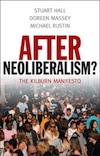The latest instalment of the Kilburn Manifesto, on class and generation under neoliberalism, will be launched at a Soundings seminar in London on Thursday 20 February.
Ben Little, co-editor of the Soundings journal, will address the question, ‘Is young the new poor?’, the subject of his chapter of the emerging manifesto, ‘After Neoliberalism?’, edited by Stuart Hall, Doreen Massey and Michael Rustin.
Little, a senior lecturer in Media and Cultural Studies at Middlesex University, argued in the Guardian last Thursday that “a generational identity” is starting to emerge “that has not been seen since the rebellions and revolutions of 1968”.
“My argument is that these shifts both justify the formation of, and constitute the bedrock for, a new political discussion that recognises both class and generation,” he writes. “The goal for people on the left now is to help this emergent identity coalesce into effective political agency.”
Author Shiv Malik, who co-wrote Jilted Generation, and Mevan Babaker of Bite the Ballot, will respond to Little’s talk.
Little will also speak on ‘Parties, Causes and Political Power’ at a Leeds Taking Soundings discussion on Wednesday 26 February.
This meeting will discuss the declining popular legitimacy of political parties and their relationship to campaigning groups, asking what this means for political power.
—-
‘Is young the new poor? Class and generation under neoliberalism’ is on
20 February 2013, 6:30 – 8:30pm, at the Marx Memorial Library, London EC1R 0DU (map)
Speakers: Ben Little (University of Middlesex & co-editor, Soundings)
Respondents: Shiv Malik (Co-author, Jilted Generation), Mevan Babakar (Bite the Ballot)
Chair: Doreen Massey, Emeritus Professor of Geography at the Open University
Tickets: £5 waged, £3 unwaged/concessions, free for Soundings subscribers
You can by tickets here.
The latest chapter of the Kilburn Manifesto: ‘A growing discontent: Class and generation under neoliberalism’, by Ben Little will be available online soon.
The Leeds Taking Soundings discussion, ‘Parties, Causes and Political Power’, is at 6pm on Wednesday, 26 February in Broadcasting Place, Leeds Met University, Woodhouse Lane, Leeds LS2 9EN. Details here.
Little’s article about ‘Parties, Causes and Political Power’ was in a recent edition of Soundings.



4 June 2014
Hello, is there anyway of obtaining a recording of this? Many thanks.
23 February 2014
To add to the statistics I gave above and to relate to Matthew’s topic – the latest unemployment figures for 16 to 24 year olds is 19.9%.
22 February 2014
The Electoral Commission show that there are over 6 million people missing from electoral registers, especially amongst the young, the mobile, the rootless, ethnic minorities, the unemployed, those in rented accomodation and the unemployed. If these are taken into account then the electoral turnouts at the last three General Elections were all below the 60% mark. Yet for the preceeding 21 General Elections back to 1922, turnouts were all over the 70% mark, peaking at 84% in 1950.
And things are set to get much worse. For the lowest levels of both registration and voting in 2010 was amongst the 18-24 age group. Only 55% of 17 year old “attainers” (who are amongst those legally obliged to be registered) and 18 years olds were registered, this rose to only 56% amongst the 19 to 24 age group. For each older age cohort the numbers then rose until it reached a peak of 94% for the 65s and over. A similar pattern operates for those who were properly registered to vote. In 2010 only 51.8% of registered 18-24s voted. This rose for each older age cohort and peaked for those 65 and over at 74.7%.
As the elderly die off election by election, then we are set for further declines in non-voting or non-registration. The alternative is for politicians to tackle the causes of this massive democratic deficit. In particular these are problems which the Labour Party needs to face up to. For the turnout in the seats which Labour took in 2010 was 7.2% below that for Conservative seats, and 6.7% below that in Lib Dem seats. A further downturn in electoral registration is likely to emerge with the current introduction of individual electoral registration.
The above trends are matched in the decline in individual party membership. Going back just some 30 years, it stood at 3.8% of the electorate in 1983 and then dropped to 1.0% in 2010, most of us seemingly being in our 70s.
The article by Ben Little (see the link provided in Matthew’s item above) is well worth examining on this issue. Some of my own ideas on what should be done can be culled from this link – http://threescoreyearsandten.blogspot.co.uk/search/label/Electoral
It helps if we pay attention to why the Chartists and the Suffragettes fought for the franchise in the first place. The vote is only the first building block of a democracy, but its full use is essential to the whole process. We need to give people progressive reasons for wishing to vote. On registration matters, it might help if we saw at least as much publicity for the need to register to vote as we do about getting people to fall into serious debt with Wonga.